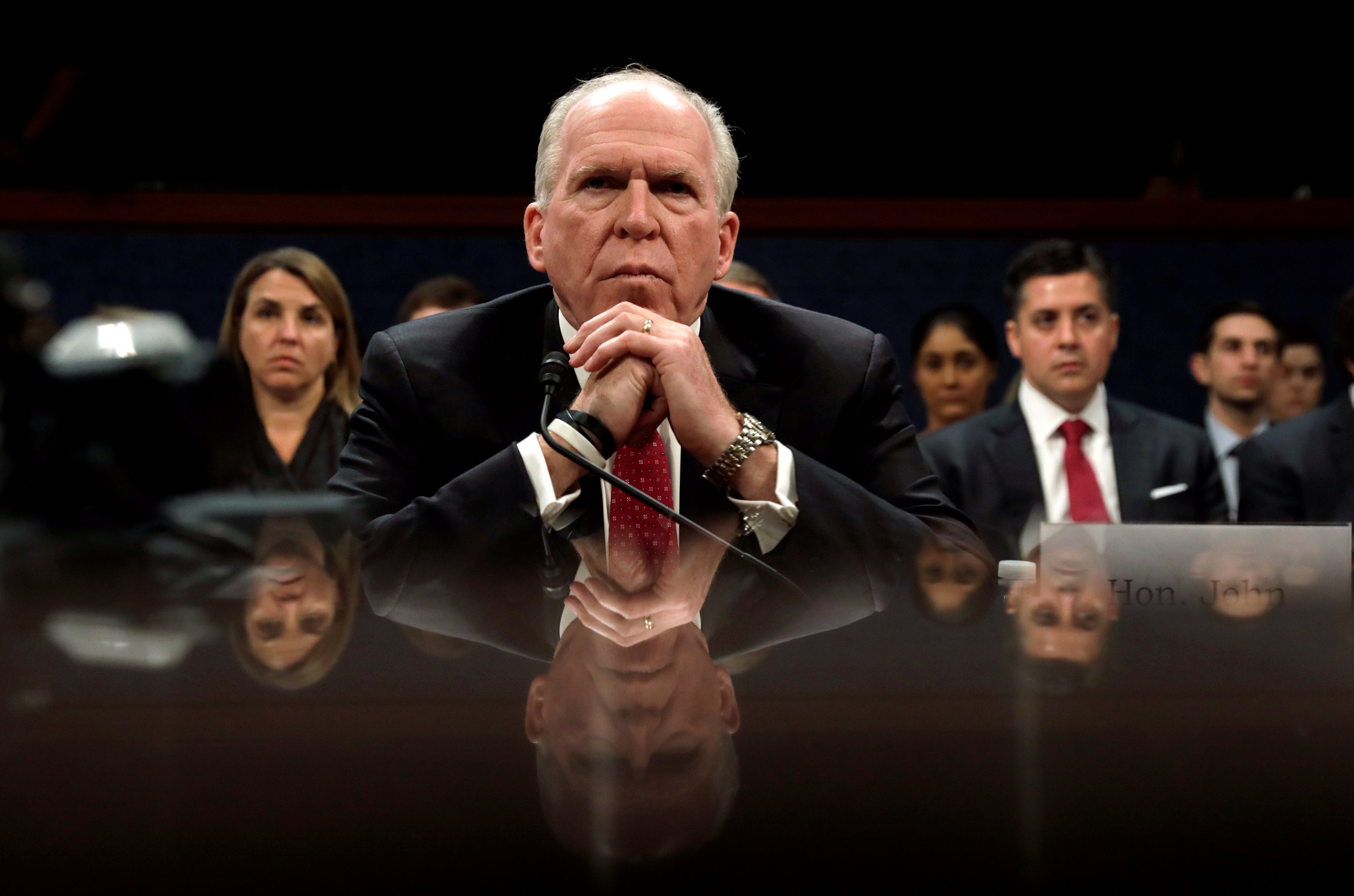
Washington: Former CIA director John Brennan said on Tuesday that he had seen signs of possible collusion between Moscow and President Donald Trump's 2016 election campaign that merited investigation, and had warned Russia last year about meddling in the election.
Brennan's comments came amid a political storm in Washington triggered by Trump's firing on May 9 of FBI Director James Comey.
Comey was heading an FBI probe into Russian election interference and possible collusion with Trump's campaign, leading to accusations by Trump critics that the Republican president has sought to curtail the FBI inquiry.
Brennan, who left as CIA chief when Trump took office in January, said it became clear last summer Russia was trying to interfere in the election, and that he warned the head of Russia's FSB security service that such interference would hurt U.S. ties.
U.S. intelligence agencies concluded in January that Moscow tried to tilt the election campaign in Trump's favour, including by hacking into the emails of senior Democrats.
Moscow has denied the allegation.
Trump has denied any collusion but the FBI and congressional probes into the Russia matter have dogged the early months of his presidency. "It should be clear to everyone Russia brazenly interfered in our 2016 presidential election process and that they undertook these activities despite our strong protests and explicit warning that they do not do so," Brennan told the House of Representatives Intelligence Committee. Republican Representative Trey Gowdy asked Brennan: "Did you see evidence of collusion, coordination and conspiracy between Donald Trump and Russian state actors?"
"I saw information and intelligence that was worthy of investigation by the bureau (FBI) to determine whether or not such cooperation or collusion was taking place," Brennan replied.
"I encountered and am aware of information and intelligence that revealed contacts and interactions between Russian officials and U.S. persons involved in the Trump campaign," he added.
He declined to elaborate, saying the information was classified. Brennan said he worried that Russians tried to recruit Americans during the presidential campaign to work for Moscow.
Brennan said it was possible for someone to be helpful to the Russian cause without realising it.
"They (the Russians) try to suborn individuals and they try to get individuals, including U.S. persons, to act on their behalf either wittingly or unwittingly," he said, adding that "Individuals going on a treasonous path often do not realise it until it is too late."
Reuters reported last week that Michael Flynn and other advisers to Trump's campaign were in contact with Russian officials and others with Kremlin ties in at least 18 calls and emails during the last seven months of the presidential race.
Brennan said he believed he was the first U.S. official to raise the matter of election interference with the Russians, citing an August 4, 2016 phone call he had with the head of Russia's FSB, Alexander Bortnikov.
He said he raised media reports of Russian attempts to meddle in the election with Bortnikov, who denied any involvement by Moscow, and told him that if Russia pursued this course it would destroy short-term prospects for improved U.S.-Russia relations.
Brennan said he later briefed congressional leaders about the intelligence agencies' finding on Russian interference in August and September. Separately, Director of National Intelligence Dan Coats was asked on Tuesday about a Washington Post report that Trump had asked Coats and Admiral Michael Rogers, director of the National Security Agency, to help him knock down the notion that there was evidence of such collusion.
At a Senate Armed Services Committee hearing, Coats sidestepped the question from Republican John McCain but did not deny that Trump made the request.
Coats said he and Trump "discuss a number of topics on a very regular basis" but "I don't feel it's appropriate to characterise discussions and conversations with the president."
Coats did say that he has made clear to the Trump administration that "any political shaping" of intelligence would be inappropriate.
The Post reported Coats and Rogers declined the request.
Democratic Senator Richard Blumenthal told Coats that the fact he had not denied the Post report should lead to "even more intensive investigation of the alleged effort by the president to enlist you in shutting down, or stifling that investigation."
"This evidence, if true, goes to criminal intent and constitutes mounting evidence of obstruction of justice," Blumenthal added.
Addressing another controversy, Coats said that U.S. intelligence agencies have not initiated an assessment of the significance or impact of any information Trump revealed in a meeting with Russia's foreign minister earlier this month.
Reuters and other media have has reported that Trump disclosed highly classified information to Russian Foreign Minister Sergei Lavrov and Russian Ambassador Sergei Kislyak about a planned IS operation.
Trump has said he shared facts in the interests of getting Moscow to do more to combat IS.
The U.S. officials who disclosed Trump's conversations said last week that while the president has the authority to disclose even the most highly classified information at will, in this case he did so without consulting the ally that provided it.
Brennan said Trump would have violated intelligence protocols if reports are true that he passed classified information to Lavrov and Kislyak.